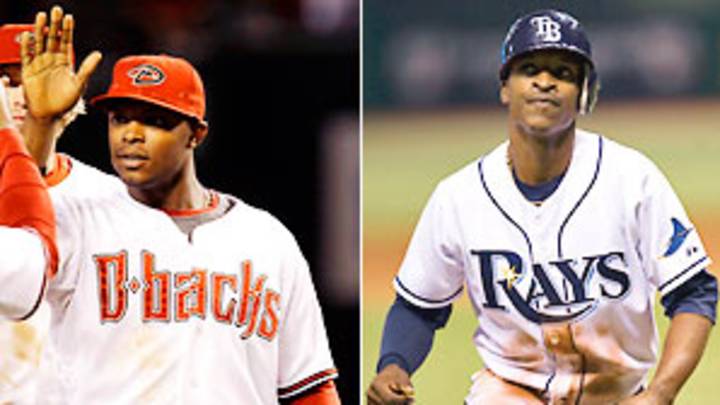A tale of two brothers: What's the difference between the Uptons?

Were science to isolate the reasons why some players are great and others aren't, the findings would likely prove depressing. I wouldn't care to have the sport's inner mysteries reduced to infinitesimal differences in the strength of tendons or microns in nerve length.
There are, of course, other possible explanations for why some players fail and some succeed. Take the case of two brothers, of nearly equal age and size, each blessed with ungodly talent. One is arguably the most valuable commodity in the sport; the other is nowhere close. Why?
Justin Upton, 21, is slugging .567 for Arizona. The entire list of men who have done better at his age or younger comprises nine Hall of Famers, plus Shoeless Joe Jackson, Alex Rodriguez and Hal Trosky, a truly great player who was all but done at 28 because of migraine headaches. In 2014 Upton will be a free agent at 26, and could be the second player ever to sign a $200 million contract.
B.J. Upton, meanwhile, is hitting .222 with little power for Tampa Bay. The 24-year-old's weak line is just one reason why the team is struggling so badly to follow on last year's epic pennant win in the style it deserves (inconsistent pitching is certainly another). Coming after last year's playoffs, during which he knocked seven home runs, lined angles in center field like a master pool player and seemingly emerged full bore as one of the game's great stars, this counts as one of the year's great disappointments.
The older Upton is no washout yet -- coming as they do after a winter shoulder operation and accompanied by terrific baserunning and defense, his lousy hitting stats aren't to be taken wholly seriously. Still, they mark a return to a pattern of alternating fitful brilliance with nearly cataclysmic failure that began with his premature 2004 major league debut and has carried on and off ever since.
Justin, by contrast, has really known nothing but success, the odd run of bad midseason form aside. After a brief, brilliant run through the minors, he debuted at 19 in the middle of a pennant race, played well in his first full season last year, and has fully arrived this year.
The difference is partly one of talent; Justin may just have a bit more. While the brothers are built similarly, B.J., at 6-3, 185 pounds, is more wiry, almost shockingly thin in person, and his gifts tilt a bit more toward the subtler aspects of the game. The 6-2, 205-pound Justin is slightly more compact, his body a bit more suited to the quick turn on a ball that defines a power hitter.
Events, though, are the greater difference. Both men, after being taken in the first two picks in the amateur draft -- B.J. at No. 2 in 2002 and Justin at the top spot in '05 -- made the major leagues for the first time at 19. It's there where their stories diverge.
B.J. came up for a wretched Devil Rays team during a season in which he had made 35 errors in the minors and was asked to play two infield positions; after posting a perfectly respectable hitting line he was sent down to the minors again the next year, where he made 53 errors at shortstop. It took two more years, which involved more errors, a third infield position and a disastrous second run in the majors, before he finally locked down a role that fit him, in center field.
His brother, by contrast, has always played one position, and once he was brought up to the majors he was up for good, through better play and worse.
The varying approaches that Tampa Bay and Arizona took with their wildly talented players show in some wildly varying results. More than his inconsistent hitting lines, B.J.'s struggles are reflected in an inconsistent approach. In 2006, for instance, he swung at 14 percent of pitches outside the strike zone; the next year, it was 19 percent, an increase of more than 35 percent. In his three seasons Justin has ranged from 24 percent to 26 percent. B.J.'s isolated power -- slugging average minus batting average, a measure of pure extra-base hitting -- dropped more than 100 points from his first to his second year, increased 150 points in his third year, and has dropped steadily since; Justin's has increased each year.
Again, this is surely partly a reflection of talent, that slight and indiscernible difference in genetics that some genius some day may be able to isolate under an electron microscope. Blind as we may be to the specific mechanics, there is no mystery here. But if, injuries and early promotion aside, B.J.'s fundamental problem has been an inability to fix on one aspect of his game and master it, it's hard not to tie that to the inconsistent way in which he was treated in his formative days as a major leaguer, when no one even seemed quite able to decide what position he should play, let alone what style he should adopt at the plate.
It's thus hard not to wonder what might have happened had he not been brought up before he was ready. This might have meant both that he would have been moved to the outfield much sooner than he was, and that once he was brought up he would have been shown at least some slight bit of confidence. Perhaps he would have been the same player; perhaps he would be the favorite to secure baseball's third $200 million contract. Perhaps none of it matters and he'll still have the better of the Uptons' careers. However it would have turned, these are early days for a pair of parallel careers we might be watching for the next 20 years. We should enjoy them.
